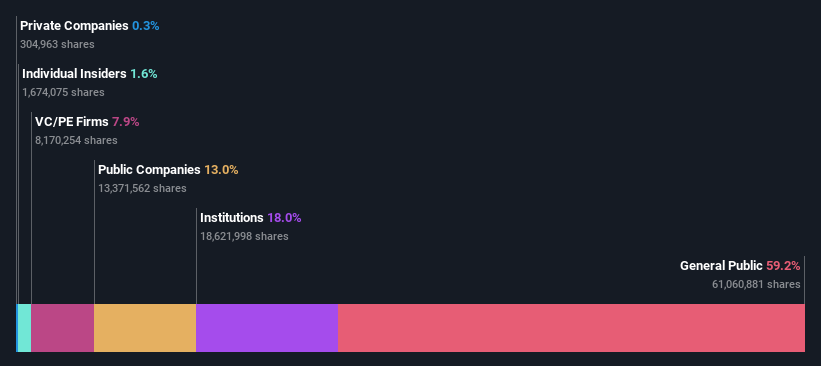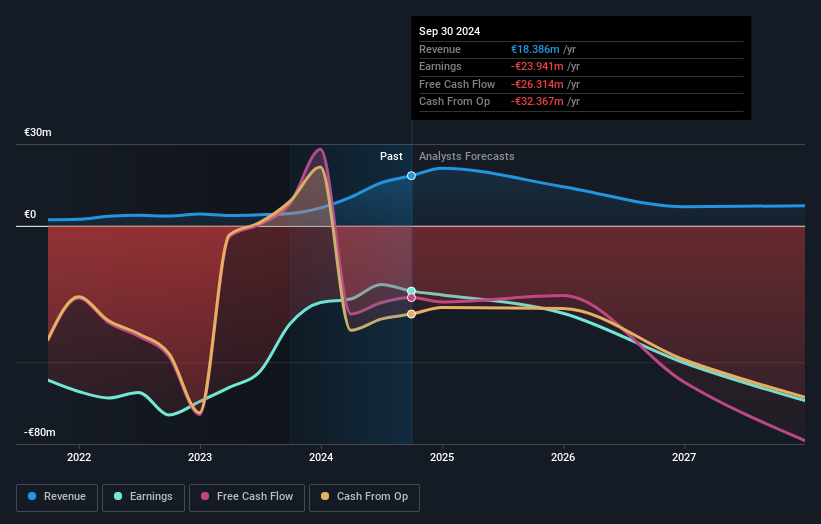- United States
- /
- Biotech
- /
- NasdaqCM:PRQR
ProQR Therapeutics N.V.'s (NASDAQ:PRQR) market cap touched US$250m last week, benefiting both individual investors who own 59% as well as institutions

Key Insights
- Significant control over ProQR Therapeutics by individual investors implies that the general public has more power to influence management and governance-related decisions
- The top 25 shareholders own 40% of the company
- Institutional ownership in ProQR Therapeutics is 18%
A look at the shareholders of ProQR Therapeutics N.V. (NASDAQ:PRQR) can tell us which group is most powerful. The group holding the most number of shares in the company, around 59% to be precise, is individual investors. In other words, the group stands to gain the most (or lose the most) from their investment into the company.
While individual investors were the group that benefitted the most from last week’s US$31m market cap gain, institutions too had a 18% share in those profits.
Let's delve deeper into each type of owner of ProQR Therapeutics, beginning with the chart below.
Check out our latest analysis for ProQR Therapeutics

What Does The Institutional Ownership Tell Us About ProQR Therapeutics?
Institutions typically measure themselves against a benchmark when reporting to their own investors, so they often become more enthusiastic about a stock once it's included in a major index. We would expect most companies to have some institutions on the register, especially if they are growing.
As you can see, institutional investors have a fair amount of stake in ProQR Therapeutics. This can indicate that the company has a certain degree of credibility in the investment community. However, it is best to be wary of relying on the supposed validation that comes with institutional investors. They too, get it wrong sometimes. It is not uncommon to see a big share price drop if two large institutional investors try to sell out of a stock at the same time. So it is worth checking the past earnings trajectory of ProQR Therapeutics, (below). Of course, keep in mind that there are other factors to consider, too.

We note that hedge funds don't have a meaningful investment in ProQR Therapeutics. Looking at our data, we can see that the largest shareholder is Eli Lilly and Company with 13% of shares outstanding. For context, the second largest shareholder holds about 7.9% of the shares outstanding, followed by an ownership of 4.8% by the third-largest shareholder. Furthermore, CEO Daniel de Boer is the owner of 0.7% of the company's shares.
On studying our ownership data, we found that 25 of the top shareholders collectively own less than 50% of the share register, implying that no single individual has a majority interest.
While it makes sense to study institutional ownership data for a company, it also makes sense to study analyst sentiments to know which way the wind is blowing. There are plenty of analysts covering the stock, so it might be worth seeing what they are forecasting, too.
Insider Ownership Of ProQR Therapeutics
The definition of an insider can differ slightly between different countries, but members of the board of directors always count. Management ultimately answers to the board. However, it is not uncommon for managers to be executive board members, especially if they are a founder or the CEO.
Insider ownership is positive when it signals leadership are thinking like the true owners of the company. However, high insider ownership can also give immense power to a small group within the company. This can be negative in some circumstances.
Our most recent data indicates that insiders own some shares in ProQR Therapeutics N.V.. In their own names, insiders own US$4.1m worth of stock in the US$250m company. It is good to see some investment by insiders, but it might be worth checking if those insiders have been buying.
General Public Ownership
The general public -- including retail investors -- own 59% of ProQR Therapeutics. With this amount of ownership, retail investors can collectively play a role in decisions that affect shareholder returns, such as dividend policies and the appointment of directors. They can also exercise the power to vote on acquisitions or mergers that may not improve profitability.
Private Equity Ownership
With an ownership of 7.9%, private equity firms are in a position to play a role in shaping corporate strategy with a focus on value creation. Sometimes we see private equity stick around for the long term, but generally speaking they have a shorter investment horizon and -- as the name suggests -- don't invest in public companies much. After some time they may look to sell and redeploy capital elsewhere.
Public Company Ownership
Public companies currently own 13% of ProQR Therapeutics stock. We can't be certain but it is quite possible this is a strategic stake. The businesses may be similar, or work together.
Next Steps:
While it is well worth considering the different groups that own a company, there are other factors that are even more important. Consider risks, for instance. Every company has them, and we've spotted 3 warning signs for ProQR Therapeutics you should know about.
If you are like me, you may want to think about whether this company will grow or shrink. Luckily, you can check this free report showing analyst forecasts for its future.
NB: Figures in this article are calculated using data from the last twelve months, which refer to the 12-month period ending on the last date of the month the financial statement is dated. This may not be consistent with full year annual report figures.
New: Manage All Your Stock Portfolios in One Place
We've created the ultimate portfolio companion for stock investors, and it's free.
• Connect an unlimited number of Portfolios and see your total in one currency
• Be alerted to new Warning Signs or Risks via email or mobile
• Track the Fair Value of your stocks
Have feedback on this article? Concerned about the content? Get in touch with us directly. Alternatively, email editorial-team (at) simplywallst.com.
This article by Simply Wall St is general in nature. We provide commentary based on historical data and analyst forecasts only using an unbiased methodology and our articles are not intended to be financial advice. It does not constitute a recommendation to buy or sell any stock, and does not take account of your objectives, or your financial situation. We aim to bring you long-term focused analysis driven by fundamental data. Note that our analysis may not factor in the latest price-sensitive company announcements or qualitative material. Simply Wall St has no position in any stocks mentioned.
About NasdaqCM:PRQR
ProQR Therapeutics
A biotechnology company, focuses on the discovery and development of novel therapeutic medicines.
Flawless balance sheet low.
Market Insights
Community Narratives



